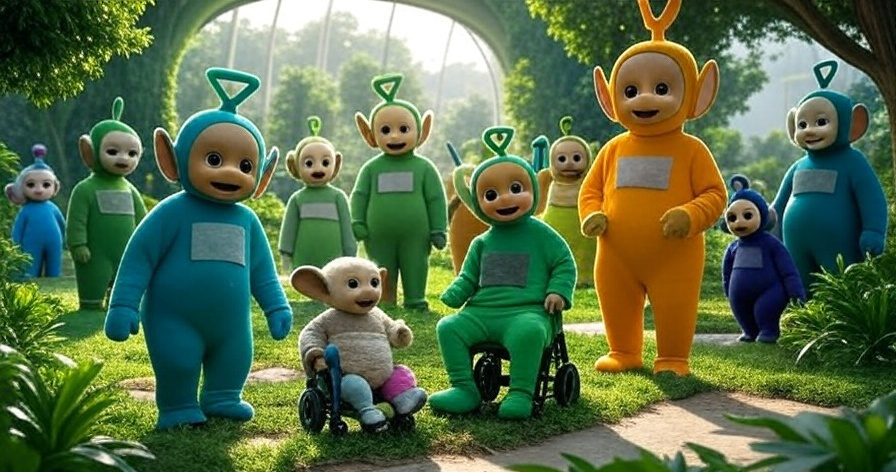
The Dark Roots of the Autism Industrial Complex
The modern concept of mental health, particularly the screening of deviant or noncompliant behaviours, took shape in the 19th-century expansion of universal schooling. As industrial economies came to rely more on brainpower and social capital than unskilled manual labour alone, businesses turned to the state, churches and charities to help cultivate a new social order. This fostered growing interest in child psychology and the classification of personality disorders with the aim of weeding out perceived bad apples from the future pool of human resources.
Early psychiatric screening helped reclassify people as biological liabilities, fuelling eugenic sterilisation in North America and Scandinavia and most notoriously the Nazi T4 euthanasia programme, where human beings were dissected, classified and discarded in the name of systemic optimisation. The same dehumanising logic has now resurfaced in the AI age treating commoners as data inputs or guinea pigs, ripe for experimentation, rather than autonomous participants with agency and consent.
Comparisons with mid 20th century National Socialism rarely bode well, as they risk trivialising the scale of systematic murder the ideology enabled and may invite accusations of hyperbole. However, we need only connect the dots between the Rockefeller Foundation, the British Eugenics Society, John Hopkins University and most ominously the Kaiser Wilhelm Institutes for Anthropology and Psychiatry (KWI-A and KWI-P) to understand the scientific basis for later sterilisation and euthanasia programmes that targeted the mentally retarded and clinically insane before the Second World War had even started.
Austrian-American psychiatrist, Leo Kanner, has long been credited with identifying infantile autism as a distinct disorder. This contrasted with his Swiss colleague Eugen Bleuler’s definition of autism as a symptom of extreme isolation observed in some schizophrenic patients. Although a social activist of Jewish heritage, Dr Kanner worked at the Rockefeller-funded John Hopkins Hospital and had initially supported the sterilisation of the feeble-minded, a view he would change in 1942 as the full horror of Nazi experiments came to light.
In 1981 Lorna Wing introduced the concept of high-functioning autism, which she named after the previously little-known Austrian psychiatrist, Hans Asperger. Prof. Simon Baron Cohen later popularised this as the extreme male brain (The Essential Difference: Men, Women and the Extreme Male Brain, 2003). However, Dr Wing brushed over Asperger’s collaboration with the euthanasia programme at the Spiegelgrund clinic. Edith Sheffer argued in her book The Origins of Autism in Nazi Vienna (2018) that Hans Asperger was not the heroic pioneer shielding vulnerable children, as Lorna Wing portrayed him, but rather a participant in a system that selected who was worthy to live based on productivity, conformity and social value. Autism, as a diagnostic category, arose within this bureaucratic, medicalised framework of surveillance, selection and ultimately disposal.
Before the rise to power of the Fatherland Front in 1934, Red Vienna under Social Democratic rule pursued a progressive eugenics agenda, in which the state aimed to improve public health, hygiene and child welfare through a mix of carrot and stick tactics. Special needs practitioners, known locally as Heilpädagogen or healing educationalists, would identify gifted children and target the unfit for sterilisation. This kind of positive eugenics overlapped with the modern ideas of child development, early education and psychological screening, but often carried implicit assumptions about heritable fitness. Later under more authoritarian administrations, this pre-existing welfare infrastructure was co-opted into a far more coercive system of negative eugenics. The psychiatric system, especially at the Spiegelgrund clinic, played a central role in the Aktion T4 child euthanasia programme. Doctors had to classify children as educable or not. Those deemed unfit were sent to euthanasia clinics. Sheffer argues that autism, particularly the notion of a socially detached child, was shaped by this broader ideological context. That is, autism was pathologised precisely because non-conforming children were seen as a threat to the Volksgemeinschaft (the racially and socially unified community).
Eugenics and psychiatry evolved symbiotically in the early 20th century with substantial funding from the Rockefeller Foundation on both sides of the Atlantic, the Harriman family and the Kellogg Foundation among others. Charles Darwin’s cousin, Sir Francis Galton founded modern psychometrics and coined the term eugenics as the scientific basis both for racial discrimination and the later technocracy movement. German neuropathologist, Emil Kraeplin is often viewed as the father of modern scientific or biological psychiatry. In 1917, German-American banker, James Loeb, a former patient of Kraeplin’s, helped fund the German Institute for Psychiatric Research, which later became part of the Rockefeller-funded Kaiser Wilhelm Society for the Advancement of Science.
Echoes of eugenics in the Swinging 60s
Despite his contempt for National Socialism, German-born psychologist, Hans Jürgen Eysenck, played a leading role the post-war promotion of psychometric testing and hereditarian theories. Along with his second wife, Sybil, Eysenck worked at the Institute of Psychiatry, King's College, where he developed a distinctive dimensional model of personality structure based on biogenetic variation. Through his prolific writing in scientific journals and broadsheet newspapers and his regular public speaking engagements, HJ Eysenck kept alive soft eugenics in the egalitarian interlude from the swinging sixties to the end of the cold war. Throughout this era, environmental determinism prevailed in psychology. Universal psychometric testing fell out of favour in Western Europe, often limited to occupational aptitude tests (civil service, military etc.), while it remained pervasive in the USA. Americans are more likely to know, discuss and treat IQ as part of personal identity. Western Europeans may undergo similar cognitive assessments but without the label, score or social meaning attached.
Marketing Deviance
In the 1980s, we began to see the proactive marketing of common emotional challenges, often through celebrity endorsement, such as depression, obsessive behaviour and social anxiety. These subjective labels would not have hitherto qualified as psychiatric conditions. American films, soap operas and sitcoms helped normalise not only psychotherapy as a rite of passage but also psychoactive medications for successful young professionals. This shift marked a significant turning point in how society perceived and addressed mental health issues.
The mainstreaming of these conditions was not merely a commercial venture but a reflection of a broader societal trend. The term mental health has become a catch-all for a wide range of behaviours and emotions that were once considered normal variations of the human experience.
Managing Noncompliance
Soviet scientists and public health officials initially embraced the Fabian approach to progressive eugenics to improve society collectively. This contrasted with Western race or class-based approaches by focusing on social and environmental conditions, rather than hereditary determinism, through family planning. Yuri Filipchenko, Alexander Serebrovsky and Nikolai Koltsov played pivotal roles in aligning genetics with socialism, founding the Russian Eugenics Society in 1920.
However, tensions soon emerged between Mendelian geneticists and Marxist ideologues, especially those wedded to socio-environmental determination of human traits. In the late 1920s Stalin cracked down on Western-influenced science and denounced Serebrovsky’s work. Soviet journals began publishing attacks on eugenics as a bourgeois science and in 1936 Eugenics was formally banned as a scientific field.
By the late 1930s, genetics itself came under fire, culminating in the rise of Trofim Lysenko, who promoted Lamarckian biology and rejected Mendelian inheritance. In the 1930s, American geneticist, Hermann J Muller, promoted a vision of soft eugenics rooted in Mendelian genetics, arguing that informed reproductive choices could reduce hereditary disease. He shared many ideals with Julian Huxley, who had invited Muller to join him at the recently founded William Marsh Rice Institute of Rice University in 1912. After accepting a short-term research post at the Kaiser Wilhem Institute in Berlin in 1932, Muller worked in the Soviet Union between 1933 and 1937. He opposed both racially motivated eugenics and Trofim Lysenko’s Neo-Lamarckian denial of genetics in the USSR, positioning himself as a scientific advocate for genetic determinism tempered by ethics.
Into the Abyss
The key players of the Nazi eugenics programmes received direct or indirect funding from American philanthropic organisations with oversight from the IFEO, International Federation of Eugenics Organizations, headed by American eugenicist Charles Davenport.
- Ernst Rüdin spearheaded psychiatric genetics, helping to draft the 1933 Sterilisation Law and providing the intellectual foundation for sterilisation and euthanasia (Aktion T4). In 1930, Rüdin argued for eugenics at the First International Congress for Mental Hygiene, held in Washington DC and two years later became President of IFEO.
- Hans Luxenburger pioneered the use of twin studies to investigate the heritability of psychiatric and neurological disorders alongside Ernst Rüdin and Franz Kallmann. The latter of Jewish descent, was purged under new racial laws In 1936. However, his colleague and the Rockefeller Foundation help him relocate to the United States where he continued research into neurological disorders via twin adoption studies.
- Otmar von Verschuer advanced racial hygiene through hereditary research, mentored Josef Mengele, and promoted sterilisation of mixed-race children and the mentally ill.
- Eugen Fischer contributed anthropological theories on race mixing and heritability that legitimised sterilisation and racial laws. He chaired the IFEO’s Commission on Bastardization and Miscegenation.
- Karl Brandt and Philipp Bouhler led the implementation of Aktion T4, coordinating mass murder of the disabled and mentally ill in gas chambers and via lethal injections. While not direct recipients of foreign funding, their actions relied on Rockefeller-funded pseudoscience that legitimised their work.
The Rockefeller Foundation played a major role in financing German eugenics research, largely through grants to the Kaiser Wilhelm Institute for Anthropology, Human Heredity and Eugenics (KWI-A) and the Kaiser Wilhelm Institute for Psychiatry (KWI-P). Between 1925 and 1935, the foundation provided nearly $3 million to German researchers, including Rüdin, Verschuer and Fischer, with specific grants such as a donation to the KWI-A in 1936 of $655,000, which would have been over 1000 times the average annual salary in Germany at the time. These funds supported studies on heredity and racial hygiene, which were later misused by the Nazis to justify sterilisation and euthanasia programs. The Foundation continued funding even after the 1933 Nuremberg Laws, though it withdrew support in 1939 when the misuse became undeniable. Only in 2021 did the Rockefeller Foundation acknowledge its historical involvement in eugenics and issued a statement supporting anti-eugenics efforts. Though the Foundation later distanced itself, it had enabled much of the scientific groundwork.
Rüdin and Verschuer developed diagnostic criteria for schizophrenia, feeblemindedness and racial purity, leading to sterilisation or euthanasia of hundreds of thousands. Fischer’s work justified the sterilisation of over 400,000 people and the targeting of mixed-race children. Beginning in 1939, Brandt and Bouhler co-led the infamous T4 euthanasia programme, responsible for the organised killing of 250,000 to 300,000 people through institutions like Hadamar, Hartheim and Brandenburg.
After the war Brandt was tried and executed at the 1947 Nuremberg Doctors’ Trial for crimes against humanity, while his colleague, Bouhler, committed suicide in 1945. However, the most influential figures, Rüdin, Verschuer and Fischer, escaped serious postwar punishment. Verschuer resumed academic work in West Germany and contributed to ongoing postwar genetics research.
While secret, news about state-sanctioned mass murder leaked out as families noticed suspicious deaths. By 1940–41 growing awareness sparked public protests, especially from the Catholic Church. Bishop Clemens August Graf von Galen (Münster, 1941) gave a famous sermon denouncing the euthanasia of the disabled. While the official programme was paused, decentralised killings continued until 1945.
In the aftermath of the Nuremberg Trials with the condemnation of coercive medical experimentation, the Universal Declaration of Human Rights affirmed that "everyone has the right to life, liberty and security of person." In the coming decades, these noble concepts would be endlessly redefined.
Shift to Behaviourism
By the mid 1930s the Soviet Union had abandoned eugenics in favour of Pavlovian behaviourism. Nobel Laureate Ivan Pavlov believed many mental disorders were malfunctions of the higher nervous activity affecting the brain’s balance between excitation and inhibition. He saw neuroses as learned maladaptations caused by excessive or contradictory stimuli or what we might now call environmental stress.
His famous experimental neuroses in dogs, created by overloading them with conflicting signals, were designed to mimic human breakdowns such as hysteria or anxiety.
Pavlov acknowledged that temperament had a physiological basis and could make an individual vulnerable to stress. However, he believed any temperament could be strengthened or weakened by the right conditioning, in contrast with hard genetic determinism common among early 20th-century eugenicists.
Unlike psychiatrists who still used moral or degeneracy theories, Pavlov framed illness in mechanistic, reversible terms. In principle, a maladaptive reflex pattern could be extinguished and replaced, meaning the person could be cured by reconditioning.
After the death of Joseph Stalin in 1953, Alexander Luria and Boris Teplov solidified Pavlov's theories on conditioned reflexes and higher nervous activity as the official paradigm for psychiatry and psychology in the USSR with the abolition of psychoanalysis and a focus on physiological mechanisms. The nomenklatura denounced psychoanalysis as a bourgeois pseudoscience and replaced it with a purely physiological model of the mind.
This new paradigm emphasised the biological and physiological underpinnings of mental illness. Soviet psychiatrists in this era viewed mental disorders not as psychological conflicts but as disturbances in the brain's higher nervous activity. This led to a rise in research on the brain's role in behaviour, emotion and cognition.
Andrei Snezhnevsky, a leading figure at the Moscow School of Psychiatry, coined the term sluggish schizophrenia (вялотекущая шизофрения or vyalotekushchaya shizofreniya) in the 1960s.
Sluggish schizophrenia could not be framed in purely Pavlovian terms. Instead, it was billed as a biological brain disorder, in keeping with Soviet claims that psychiatry was a medical science, not social policing. Symptoms included pathological reformism, perseverance in defending one’s opinion and suspiciousness toward the authorities. Progression was said to be extremely slow, sometimes over decades, which made it convenient for indefinite confinement. We could almost describe as an adult form of oppositional defiant disorder.
Although Pavlov’s reflex theory was still officially revered, by the 1960s Soviet psychiatry had moved towards biological determinism in mental illness, at least rhetorically, while quietly applying ideological criteria. Sluggish schizophrenia worked politically because it allowed the state to present dissenters as biologically ill, not criminal and framed nonconformity as a medical risk to society rather than a legitimate political stance.
In the West, John B Watson pioneered our understanding of behaviourism. He believed that psychology should focus only on observable behaviour, not internal mental states. Watson famously claimed he could shape any infant into any kind of adult purely via conditioning, given control of their environment. Although active during the height of the American eugenics’ movement (1900s–1930s), Watson preferred environmental explanations. While eugenicists promoted sterilisation to eliminate defective genes, Watson’s emphasis on environmental control implied that upbringing could override biology, making sterilisation less central from his perspective. However, behaviourism’s blank slate rhetoric could co-exist with eugenics in policy circles: one could argue for “improving” the environment and removing genetic defects simultaneously.
B.F. Skinner (1904–1990) developed the concept of operant conditioning as behaviour shaped by reinforcement and punishment with applications education, social engineering, psychiatric treatment and even utopian communities such as Walden Two.
Skinner did not outright deny genetic influence, but like Watson, he prioritised environmental control as the main lever for shaping society. He was less politically engaged in eugenics debates than some contemporaries, focusing instead on behavioural technology for improving the human condition. Skinner’s framework allowed policymakers to imagine behaviour as infinitely malleable, potentially reducing the scientific rationale for sterilisation. But in practice, both approaches could operate in parallel, eugenics targeting the “unfit” biologically, behaviourism reforming those deemed socially deviant. In the U.S., compulsory sterilisation laws (e.g., Buck v. Bell, 1927) targeted the “feebleminded,” mentally ill, epileptic and criminal. Many eugenicists saw mental illness as heritable; sterilisation was framed as preventive public health. Behaviourism did not drive these laws, inspired by hereditarian psychiatry and social Darwinism, but it could be used alongside eugenics to manage those who remained. Skinner marked a shift from conditioning reflexes to operant shaping of complex behaviours. Both contributed to a vision of society as modifiable through controlled stimuli and reinforcement schedules.
While behaviourism offered an alternative to purely genetic determinism, in authoritarian settings it could blend seamlessly with policies aimed at eliminating or re-engineering undesirable traits.
Going Underground
A belief in genetic determinism, that intelligence, personality and social potential are largely hereditary, underpinned much of pre-1945 racial eugenics and continues to feed into some strands of modern genetic engineering discourse. But such determinism is not a necessarily prerequisite for psychiatric abuse. In the Soviet model, the suppression of dissent through psychiatry relied less on heredity than on identifying and neutralising politically unsound tendencies, regardless of genetic origin. By contrast, progressive eugenics retains the selective impulse of its racial counterpart but redefines its ideal population: discrimination is not based on skin colour or ethnicity, but on perceived educability and ideological alignment. In their utopian vision, progressive eugenicists envisage a society as a network of university campuses, with the uneducable or stubbornly traditional relegated to controlled reservations, vestiges of the past preserved only for heritage value.
In their 1994 book, The Bell Curve, Richard Herrnstein and Charles Murray marked a big shift away from the intellectual egalitarianism of the boomer decades. It had once again become politically correct to affirm that some people are more intellectually gifted than others. The Overton window shifted further eight years later when Steven Pinker, a self-declared liberal, wrote a scathing critique of behaviourism in his best-seller, the Blank Slate. While the new generation of evolutionary psychologists steered clear of endorsing eugenics or distanced themselves from racial sociobiology, they cleared the way for a more radical departure from the existentialism of the 1960s with its emphasis on personal agency. Both radical behaviourism, as favoured by Soviet psychologists, and hard genetic determinism, as favoured by neoliberal sociobiologists, reduce human beings to mere programmable machines with only the illusion of free will. They share a mechanistic view of humanity and differ mainly in their focus on our hardware, as in our genetic inheritance, versus software, as in our environment in determining divergent intellectual and behavioural outcomes. While academics debated the relative importances of genes and memes, both concepts could be invoked to justify a more stratified society with greater surveillance and restrictions on personal freedom.
Groupthink
The infamous Asch and Milgram experiments illustrate the dynamics of group conformity and obedience, revealing how individuals often prioritise social acceptance over critical thinking. Solomon Asch's studies demonstrated that people would conform to a group's incorrect answers, while Stanley Milgram's research on the early 1960s highlighted the extent to which individuals would obey authority figures, even to the point of inflicting harm on others. Participants played the role of teachers instructed to administer increasingly severe electric shocks to learners, in reality actors, if they gave incorrect answers. In this framework, human actions are seen as responses to social pressures rather than autonomous choices. However, Asch maintained a belief in the potential for critical thinking and free will, even in the face of conformity. By contrast, Milgram's findings suggested that obedience to authority could diminish individual moral agency, indicating that emotions and situational pressures might often override critical thinking. Together, their work illustrates the complex interplay between group behaviour, individual agency and the factors that influence our actions.
On the one hand, the reductionist camp views humans as deterministic systems, whether biological or environmental, leading to greater social control and via psychiatry, education, sterilisation, while on the other hand the voluntarist camp sees humans as moral agents, capable of genuine choice, favouring the ethics of responsibility, dignity and personal liberty.
Free Will and Mind-Body Dualism
Philosophers have long wrestled with free will and its implications for self-determination, personal responsibility and informed consent. From a hard determinist standpoint that views the world through a materialist lens, our desires and needs are mere products of a complex maze of interweaving biological processes and environmental stimuli. We would have no greater intrinsic worth than the bacteria swimming in a petri dish with only the illusion of freedom. Compatibilists try to reconcile material determinism, as in the belief that nothing exists outside the physical realm, with personal agency and independence of mind. Arguably, true free will, at least within our physiological constraints, relies on mind-body dualism, that has long been out of favour with mainstream neuroscientists. In his book “Free Agents, How Evolution Gave Us Free Will”, Kevin J. Mitchell provides a compelling case that we are not mere machines responding to physical forces but purposeful agents. Nevertheless, he rejects the kind of magical dualism associated with René Descartes. This physicalist outlook stands in stark contrast to John C. Eccles’ and Karl Popper’s thinking in their 1977 book, The Self and its Brain, which lays out the case for scientific dualism that maintains the mind (self) is not reducible to the brain and conscious will can affect the probabilities of synaptic events through quantum indeterminacy. Roger Penrose, a mathematical physicist and philosopher of science, argues that computation cannot emulate consciousness. In his 1989 book The Emperors’ New Mind he hypothesised quantum mechanics may give rise to human consciousness. Penrose later teamed up with Stuart Hameroff to develop the orchestrated objective reduction theory (Orch-OR), that sees consciousness arise from non-computable quantum processes in the brain’s microtubules. If Penrose is correct, then our minds cannot be reduced to algorithms and replicated in machines, placing a hard ceiling on artificial general intelligence (AGI). The implication is profound. It affirms a unique worthiness of human beings, not just as complex information processors but as conscious agents in a way machines can never be. Conversely, if the reductionist models favoured by mainstream science prevail, the ruling classes may come to see most of humanity as expendable zoo animals. Human rights only make sense if we value people’s inner selves and not merely their utility in terms of their physical or mental dexterity.
The Equality Delusion
In the boomer decades, we assumed that most adults could participate fully in society as respected workers, parents, neighbours and engaged citizens. Schools strove to provide equal opportunities rather than lifetime guardianship. The mentally handicapped accounted for a tiny minority with rare and profound impairments. Everyone else was assumed to be accountable for their actions. Parents and extended kin bore the moral and practical duty of raising children. State agencies intervened only in extreme cases of neglect and abuse. We have since experienced thirty to forty years of managed stratification by personality and intelligence profiles with the growing demonisation of the unenlightened underclasses. Ironically in the same period, the child welfare system has become increasingly obsessed with equality, diversity and inclusion, while on the ground the wealth gap continues to grow and a global superculture supresses a rich tapestry of rooted cultural traditions.
Many still assume the progressive managerial classes seek to redress inequality and promote cultural diversity as an antidote to global homogenisation. Yet nothing could be further from the truth.
The mental health mantra focuses on our adaptability to a socially re-engineered world. It medicalises incompatibility with the system. While most professionals in the extended social care sector believe they are helping to improve livelihoods, their superiors have other thinly veiled plans for an intellectually tiered society.




